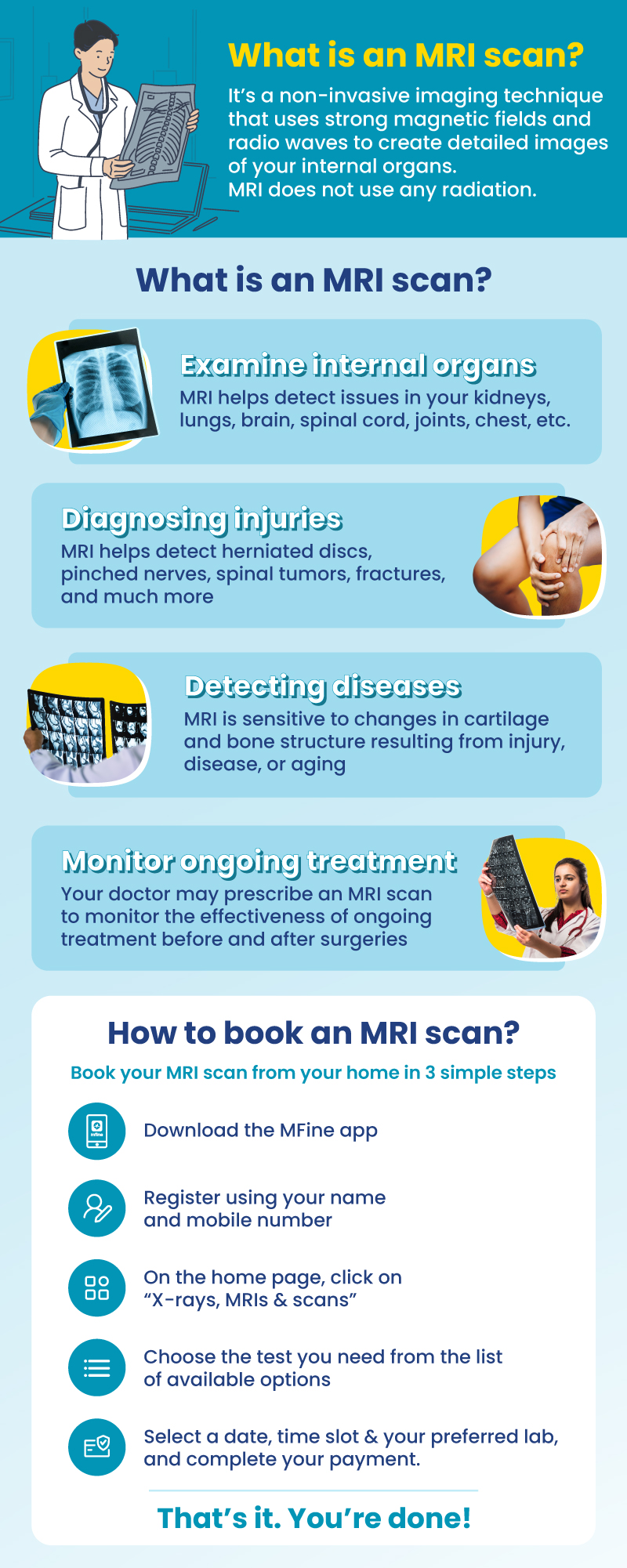
Don’t miss out on this opportunity to get great discounts on Knee MRI scan rates in Hyderabad.
MFine offers you high-quality lab options and an excellent discount of put 50% off on your MRI Knee in Hyderabad.
MRI Scan Knee Cost in Hyderabad by MFine
|
Generally, the market price of an MRI Scan Knee Cost in Hyderabad is above ₹6500 but with us, you can get it for ₹3415 only.
Avail of this exclusive offer by calling us on
Or you can click on the button below for us to call you back.
When you book your Knee MRI in Hyderabad with us, not only will you save big on the scan cost, but you’ll also receive a FREE online consultation with a doctor.
Knee MRI scan costs in Hyderabad
The following is the list of the most common MRI knee scans done in Hyderabad and their offer price. Note that the prices mentioned below may vary. Call us to know the updated prices.
| MRI Knee Cost in Hyderabad | Offer Price |
| MRI Knee Price in Hyderabad | ₹3415 |
| MRI Both Knee Price in Hyderabad | ₹5200 |
Call us at 08068920280 to know the lab options near your place in Hyderabad and make a booking at your convenient time.
Why should I book MRI through MFine?
|
Exclusive Benefits with MFine
(1) Certified labs
Get access to over 600+ labs certified by NABL and NABH
(2) Same-day slot available
Get scans done on the same day
(3) Quick and convenient
Get reports in 12 hours and digital films in 15 – 20 minutes
(4) FREE Consultation
Post scans, consult a doctor for free to review your report
All about knee MRI scans
The knee is a fascinating joint that allows us to walk, run, and move freely. But beneath its simplicity lies a complex system of bones, cartilage, ligaments, tendons, muscles, and more, all working together to keep the knee stable and mobile.
Sometimes, the knee can face issues like injuries or conditions that need careful examination. To uncover the mysteries of the knee and find out what’s wrong, doctors use a special test called a knee MRI scan. In this article, we will take you on a journey to explore the wonders of the knee joint, the importance of knee MRI scans, why doctors order them, and what to expect during the scan.

Different components of the knee joint
- Bones:
- Femur (Thigh Bone): This big bone in your thigh supports your body weight and helps you move your knee.
- Tibia (Shin Bone): The bigger bone in your lower leg, helping you stand and walk.
- Patella (Knee Cap): The small bone in front of your knee that protects the joint and helps with movement.
- Cartilage:
- Meniscus: Two C-shaped pads that act like cushions in your knee, helping to absorb shocks and keep the joint steady.
- Articular Cartilage: A smooth covering on the ends of bones, allowing them to glide easily and protecting them from damage.
- Ligaments:
- ACL (Anterior Cruciate Ligament): Keeps your knee stable by preventing the shin bone from moving too far forward.
- PCL (Posterior Cruciate Ligament): Does the opposite job of the ACL, keeping the shin bone from moving too far backward.
- MCL (Medial Collateral Ligament): Stops the knee from bending too far inward.
- LCL (Lateral Collateral Ligament): Prevents the knee from bending too far outward.
- Tendons:
- Quadriceps Tendon: Connects the powerful quadriceps muscles to the patella, allowing you to straighten your leg.
- Patellar Tendon: Connects the patella to the shin bone, helping you jump and run.
- Muscles:
- Quadriceps: These muscles in the front of your thigh help extend your knee and straighten your leg.
- Hamstrings: Muscles at the back of your thigh that help you bend your knee and move your leg backward.
- Gluteal Muscles (Glutes): Located in your buttocks, they provide stability and support for your knee during weight-bearing activities.
- Joint Capsule: A thin, tough covering around your knee joint that helps keep it stable. It contains synovial fluid to keep the joint lubricated.
- Bursae: Fluid-filled sacs that reduce friction between different parts of the knee, ensuring smooth movement.
Why Knee MRI Scans Are Important?
Knee MRI scans play a crucial role in the world of medicine, especially for knee-related problems. They use strong magnets and radio waves to create detailed images of the knee’s insides. This is important because:
- Precise Diagnosis: MRI scans provide clear pictures of the knee, helping doctors accurately diagnose injuries and conditions like ligament tears, cartilage problems, and fractures. This leads to better treatment plans.
- Checking for Degenerative Conditions: MRI scans can show changes in your knee joint caused by conditions like osteoarthritis. This helps doctors monitor your knee health and provide the right care.
- Planning for Surgery: If you need knee surgery, an MRI scan will show the surgeon exactly what’s wrong and help them plan the best way to fix it.
- Checking Healing: After surgery or during recovery, MRI scans can show how well your knee is healing and if any additional treatment is needed.
When Do You Need a Knee MRI Scan?
Your doctor may order a knee MRI scan for different reasons, including:
- Injuries: If you have hurt your knee in an accident or while playing sports, an MRI can help find out what’s damaged and how bad it is.
- Knee Pain that Won’t Go Away: If your knee hurts for a long time and other tests don’t show the cause, an MRI can provide more information.
- Chronic Conditions: If you have a long-term knee problem like arthritis, an MRI can show how it’s affecting your joint.
- Before Surgery: If you need knee surgery, an MRI will give the surgeon a clear picture of your knee and help them prepare for the procedure.
- Unexplained Symptoms: If you have knee problems that can’t be explained by other tests, an MRI can give more details.
What Happens During a Knee MRI Scan?
A knee MRI scan is safe and painless and usually takes 30 to 60 minutes. Here’s what to expect:
- Getting Ready: You may need to wear a hospital gown and remove any metal objects or jewelry.
- Positioning: You will lie down on a table that slides into the MRI machine.
- Staying Still: It’s essential to stay still during the scan to get clear pictures. The MRI machine may make loud noises, but you’ll be given earplugs or headphones to block the sound.
- Contrast Agent (If Needed): In some cases, you may get a special dye through an IV to make certain parts of your knee show up better in the images.
- Comfort: If you feel uncomfortable in the MRI machine, let the technologist know. They can help you feel more at ease.
FAQs
Can shin splints be seen on MRI?
Yes, MRI can show signs of shin splints by capturing detailed images of the affected area, including soft tissues and bones.
How long does a shin MRI take?
A shin MRI typically takes around 20 to 45 minutes, but the exact duration can vary based on the facility and specific imaging requirements.
Can MRI detect leg pain?
MRI can help identify the underlying causes of leg pain by providing detailed images of the bones, muscles, tendons, and other structures in the leg.
Can MRI detect bone pain?
While MRI can’t directly detect pain, it can reveal abnormalities or injuries in bones and surrounding tissues that might be contributing to bone pain.
Which is better, a bone scan or MRI?
The choice between a bone scan and MRI depends on the specific condition being investigated. MRI is generally better for detailed imaging of soft tissues and bones, while a bone scan is used to identify areas of increased bone activity, such as in cases of bone tumors or infections. Your doctor will decide which is more appropriate for your situation.
Read more on Which is Better: CT Scan or MRI?
Other topics you may be interested in:
| For further assistance call us on ☏08068920280 |

 Call us:
Call us:


 Call
Now
Call
Now